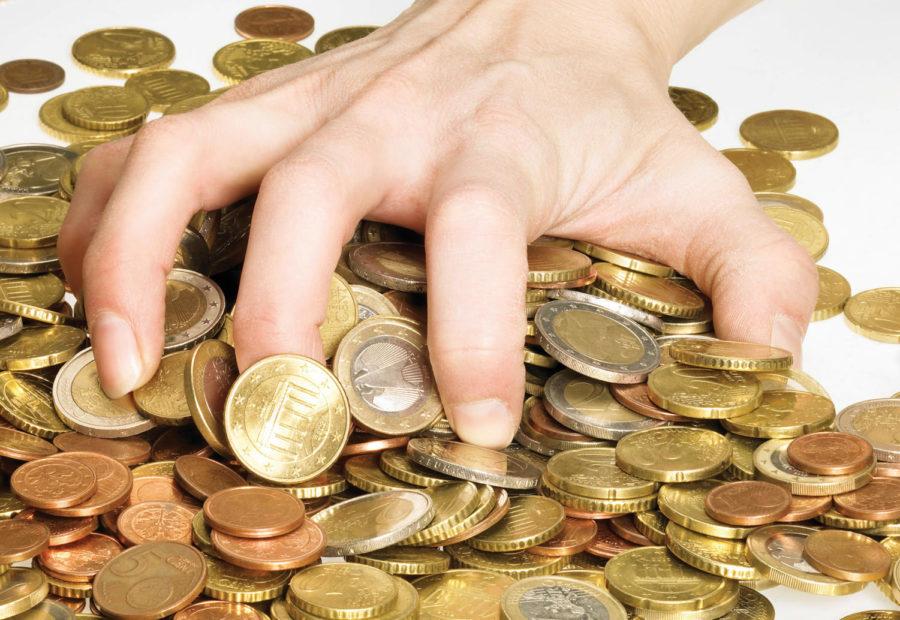Snell: Vice, virtue and the American government
hand while gathering euro coins
February 8, 2012
Frankly, all the complaining about greed recently is starting to bore the hell out of me.
Yes, yes, we know: You greed haters are all riled up about the fact that a small percentage of people have the largest percentage of money in America. Ignoring the obvious element of jealousy and the fact that economics is not a zero-sum game, let’s examine the problem briefly.
Our current crop of economic woes began with the mortgage crisis, which dragged down Wall Street, which brought down the economy, in turn leading to ineffective bailouts, and so on. We all know the domino story by now.
Essentially, Wall Street made a bunch of investments backed by crappy mortgages.
Everyone is quick to blame the banks for issuing mortgages to high-risk folks, the usual excuse being that they were — here it comes — greedy. This finger-pointing is usually quickly followed up by cries for more government regulation to curtail and punish greed.
But was greed really the cause of our economic failure, or something else?
In 1977, during the Carter administration, the federal government gave us the Community Reinvestment Act. The CRA was aimed at promoting home ownership by providing mortgages for people who previously were considered ineligible for home loans. The act was greatly expanded during the Clinton administration.
In short, the federal government told banks they had to dole out subprime mortgages to high-risk borrowers. People with low incomes got huge loans for houses beyond their means, and mortgages were issued with no down payments. And boy, how the money flowed! The market couldn’t keep up with the demand. Housing exploded, along with jobs, and life was good for awhile.
Then the inevitable happened: People whose lifestyles outpaced their incomes stopped paying their bills. Jobs were lost. Investments crashed. Money stopped moving. The house of cards finally collapsed.
The irony is that the free-market advocates about whom the greed zealots constantly complain warned that this would be a problem someday. Chalk one up to the free marketeers.
Naturally, blame falls on many shoulders and many causes. We cannot forget the massive growth in technology and markets during the same period, which was gas on the fire. The Soviet Union collapsed, new nations formed, global markets opened, computers crept into every aspect of society, the Internet as we know it now was born and personal credit boomed.
The pace of life and business accelerated, setting us up for an even bigger fall.
Fellow Daily columnist Michael Glawe said in the Monday edition that greed is a vice. He was right, and as a vice, greed is therefore a value judgment that makes this whole argument one of virtue. But this then begs a very important question: In a pluralistic society like America where everyone has individual ideas and beliefs, how do we figure out what virtues we ought to promote in civil society?
This is an ancient problem, and one the founders were familiar with. This is why you won’t find police powers in the Constitution. Our federal government was not intended to make laws promoting virtue, as doing so is the antithesis of freedom.
After all, who gets to decide what virtues? Certainly not a majority as the Constitution clearly creates a republic and not a democracy, in order to protect minorities — especially if they’re a minority of one.
Further, the greed argument assumes that bankers and Wall Street types were somehow less greedy prior to the boom, bust and bailout. Save a few radical left-wingers who think everyone should share everything, no one really worried about greed when life was roses. If greed wasn’t a national problem the day before the bubble burst, why is it suddenly a problem the day after? Did the vice change? Of course not.
So what happened?
It wasn’t greed, it was failure. The banking system, Wall Street, the federal government — they all failed. Not on purpose of course, but failure is viewed negatively in American culture. What really burned us, though, were the bailouts, first with George Bush, then again with Barack Obama, making the matter even worse. The failure was bad enough, then we rewarded it. Twice!
That hurt, and it still hurts. Somebody else screwed up and we got to pay for it. Our ideologies aside, I think that’s what we’re all truly upset about.
The conversion of this argument from one of our failures to one of greed is harmful to the body politic. It is an inadvertent invitation for government to promote civic virtue. Our government was meant to be neutral on matters of vice such as greed, as within American society it would be impossible to arrive at any concrete definition of virtue, forcing us to fall back to majority rule at the expense of the minority.
As Ghandi said, be the change you want to see. Individuals didn’t have to get upside-down in their mortgages, nor did they need to rack up credit card debt. Citizens didn’t have to consent to allowing the federal government to make banks issue bad mortgages; we could have voted the congressmen responsible out. But we didn’t.
If there’s greed anywhere, it lies within us — our own vice — not the banks or anyone else.
Our economic issues today are rooted in government creating trouble, then rewarding failure. Let’s keep greed out of the argument. It’s getting old and clearly we’re going nowhere with it.







